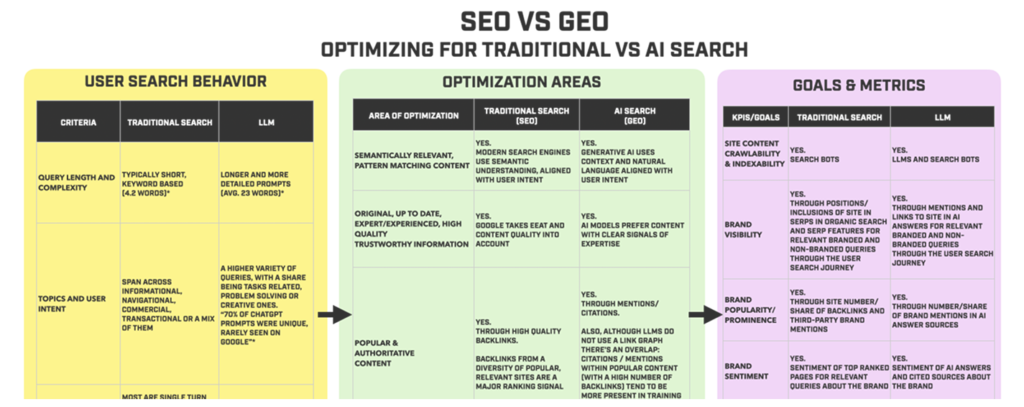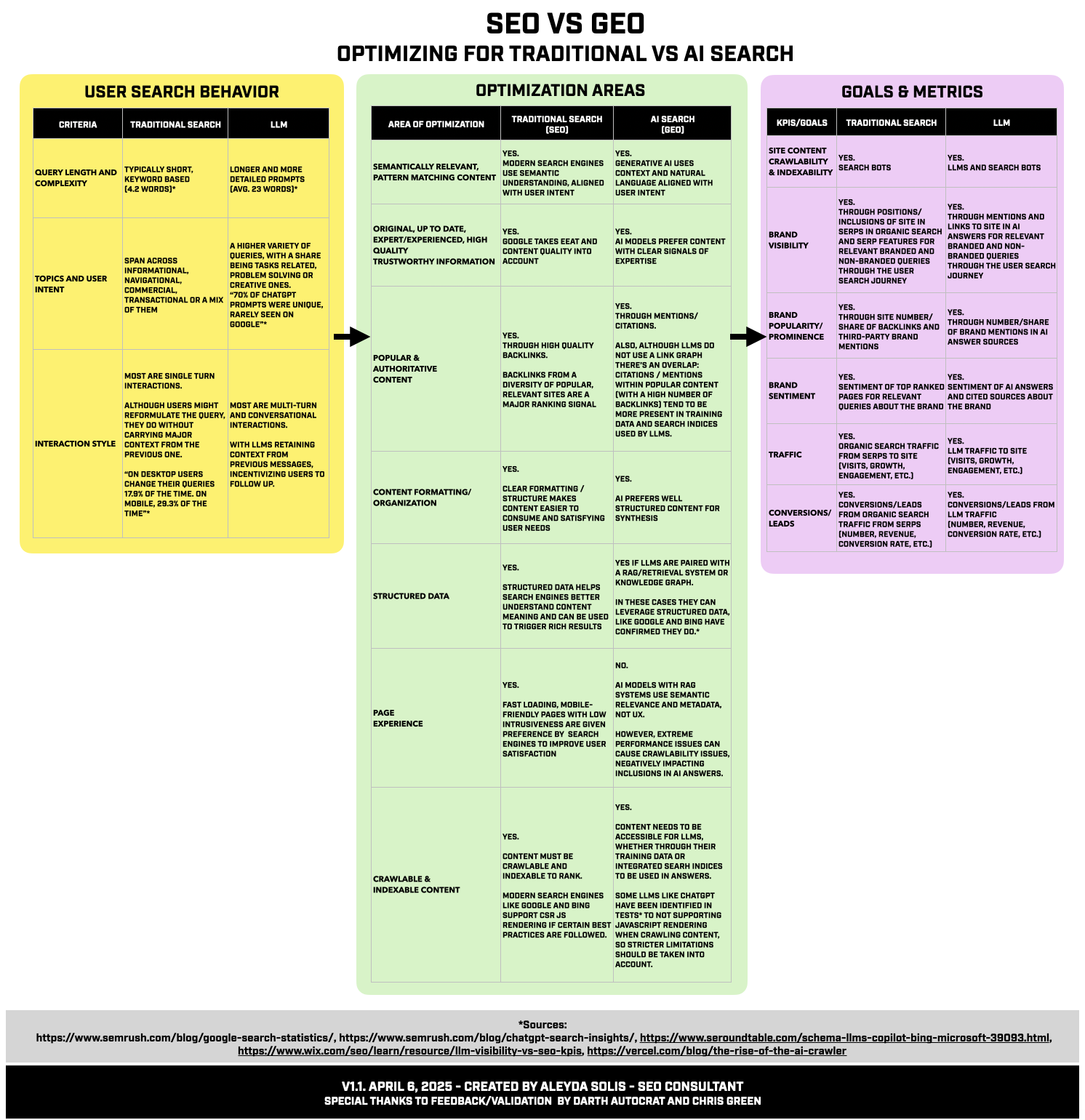What’s the overlap between AI Search vs traditional search results optimization?
I’ve created a comparison going through search behavior, areas of optimization and KPIs to track and goals to achieve, and as you can see below, at a high level what actually changes is the user search behavior.
Let’s go through each of the areas specified above, along with a few resources:
User Search Behavior
User search behavior is the aspect that changes the most between traditional search engines vs LLMs, let’s go through the top criteria:
Criteria | Traditional Search | LLM |
Query length and complexity | Typically short, keyword based
(4.2 words)* | Longer and more detailed prompts
(avg. 23 words)* |
Topics and user intent | Span across informational, navigational, commercial, transactional or a mix of them | A higher variety of queries, with a share being tasks related, problem solving or creative ones.
“70% of chatgpt prompts were unique, rarely seen on Google”* |
Interaction style | Most are single turn interactions.
Although users might reformulate the query, they do without carrying major context from the previous one.
“on desktop users change their queries 17.9% of the time. On mobile, 29.3% of the time”* | Most are multi-turn and conversational interactions. With llms retaining context from previous messages, incentivizing users to follow up. |
Optimization Areas
There’s a high overlap in the optimization areas for traditional search and LLMs:
Area of Optimization | Traditional Search (SEO) | AI Search (GEO) |
Semantically relevant, pattern matching content | Yes. Modern search engines use semantic understanding, aligned with user intent | Yes. Generative AI uses context and natural language aligned with user intent |
Original, up to date, expert / experienced, high quality
trustworthy information | Yes.
Google takes eeat and content quality into account | Yes.
AI models prefer content with clear signals of expertise |
Popular &
authoritative
content | Yes.
Through high quality backlinks.
Backlinks from a diversity of popular, relevant sites are a major ranking signal | Yes. Through mentions/citations.
Also, although llms do not use a link graph there’s an overlap: citations / mentions within popular content (with a high number of backlinks) tend to be more present in training data and search indices used by llms. |
Content formatting / organization | Yes.
Clear formatting / structure makes content easier to consume and satisfying user needs | Yes. AI prefers well structured content for synthesis |
Structured Data | Yes. Structured data helps search engines better understand content meaning and can be used to trigger rich results | Yes if LLMs are paired with a rag/retrieval system or knowledge graph.
In these cases they can leverage structured data, like google and bing have confirmed they do.* |
Page Experience | Yes. Fast loading, mobile-friendly pages with low intrusiveness are given preference by search engines to improve user satisfaction | No. AI models with rag systems use semantic relevance and metadata, not UX.
However, extreme performance issues can cause crawlability issues, negatively impacting inclusions in AI answers |
Crawlable &
indexable content | Yes.
Content must be crawlable and indexable to rank.
Modern search engines like google and bing support csr js rendering if certain best practices are followed. | Yes. Content needs to be accessible for llms, whether through their training data or integrated searh indices to be used in answers.
Some llms like chatgpt have been identified in tests* to not supporting javascript rendering when crawling content, so stricter limitations should be taken into account. |
Goals and Metrics
In the case of goals and metrics, the differences are mainly based on the type of goals that should be followed based on the user behavior characteristics of the two platform types and their specific interfaces, however, at a high level, we will want to track similar KPIs:
KPIs/Goals | Traditional Search | LLM |
Site content crawlability & indexability | Yes. Search bots | Yes. LLMs and search bots |
Brand visibility | Yes. Through positions/inclusions of site in serps in organic search and serp features for relevant branded and non-branded queries through the user search journey | Yes. Through mentions and links to site in ai answers for relevant branded and non-branded queries through the user search journey |
Brand popularity / prominence | Yes. Through site number/share of backlinks and third-party brand mentions | Yes. Through number/share of brand mentions in AI answer sources |
Brand sentiment | Yes. Sentiment of top ranked pages for relevant queries about the brand | Yes. Sentiment of AI answers and cited sources about the brand |
Traffic | Yes.
Organic search traffic from serps to site (visits, growth, engagement, etc.) | Yes. LLM traffic to site
(visits, growth, engagement, etc.) |
Conversions / Leads | Yes. Conversions/leads from organic search traffic from serps
(number, revenue, conversion rate, etc.) | Yes.
Conversions/leads from llm traffic
(number, revenue, conversion rate, etc.) |
TL;DR
There’s a very high overlap when optimizing for LLMs and traditional search engines, as well as the metrics to keep track. The actual major differences come in the user behavior, -as well as the current limitation in access of information for such data, like search popularity of queries in LLMs- and hence the type of content that it will make sense to prioritize and focus on for one or the other, as well as the different type of goals that we seek to achieve when doing it so.
I expect that with the rapid adoption of LLMs, as well as more access to data provided by LLMs and traditional search engines with AI search features -and third party tools that facilitate us their analysis-, we should be able to start putting in practice dedicated strategies to maximize visibility and conversions that make sense in each of these search platforms.
Sources
The insights/data mentioned above are from:
- 34 Eye-Opening Google Search Statistics for 2024
- Investigating ChatGPT Search: Insights from 80 Million Clickstream Records
- The rise of the AI crawler
- Microsoft Confirms Schema Helps Its LLMs (Copilot) Understand Your Content
- LLM visibility vs. SEO KPIs: Bridging the gap
Special thank you’s
To Darth Autocrat and Chris Green for his review and feedback of this piece.
More about AI Search
Interested on more information about AI search? Here are other recent guides and videos I’ve shared about AI search related topics that you might find useful:

